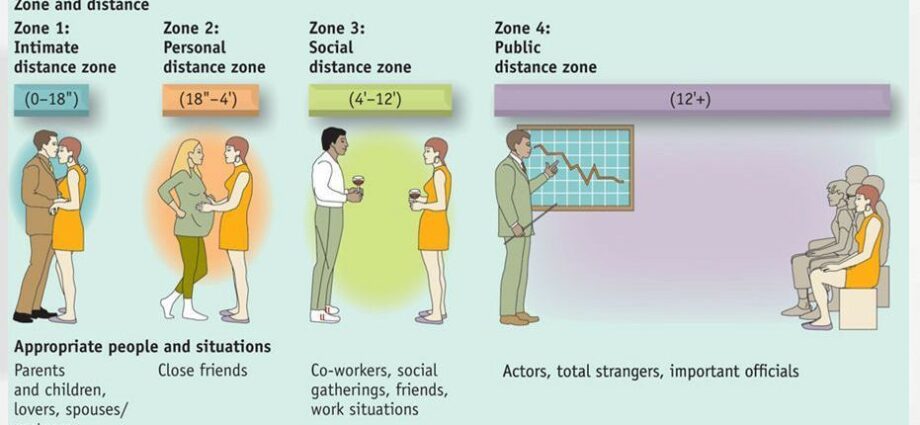Contents
😉 Greetings to all my readers! Friends, a person’s personal space is very important. People who do not have this are more likely to get sick and live less.
What is personal space
The expression “personal space of a person” is known to everyone, it includes:
- our body, feelings and the whole inner world with emotions, thoughts, actions. Personal information space is the right to secrecy;
- personal time is time that is free not only from work, but which we can devote only to ourselves. Time to be alone with your thoughts, just take care of yourself, read a book, sit at the computer or just be lazy;
- it is both physical and material things, like a toothbrush, laptop, jacket, favorite cup;
- a place where we can retire. Everyone should have their own “secluded corner”, their own “island”, where we gain strength, where you can stay in silence and recover. This is a “magical place” where no one else can enter. It can be a house, a person, a “corner” inside you. Go there when you are tired, when you just need to relax and gain strength, warmth …
Personal space zones:
Personal
Have you noticed when passengers in public transport try to take seats so that they can sit alone? They create a comfort zone for themselves, a corner of their space. Most often, they mean a remote space in which a person is comfortable. It is subdivided into separate zones:
Intimate
This is the distance of an outstretched arm, about 50 cm. It is intended only for the closest people: children, parents, spouse, loved one.
Personal
A radius of about 0,5-1,5 meters – for friends and well-known people.
Social
The radius is about 1,5-4 meters, intended for unfamiliar people.
Public
Located outside 4 meters. This is the farthest zone in the space that a person relates to himself.
Studying geopolitics at the university, I learned about a very interesting fact. For northern and southern peoples, the distance of personal space is sharply different. The farther north the country is, the larger this space (in terms of population density). The difference can be seen in the example of queues in different countries (southern and closer to the north).
This difference can even lead to ethnic conflicts. The temperamental southerner invades the intimate zone of the reserved representative of the northern people. He himself perceives this distance as social, and his friendliness looks like aggression.
Conversely, the distance normal for a European in the eyes of an Eastern person will be a demonstration of coldness and detachment.
Compare two pictures: the queue in Japan and the queue in India.

Queue in Japan

Queue in India
Violation of personal space
In addition to love and respect for loved ones, you need to have a sense of tact not to overstep the line of their personal space.
A person who respects his personal space perfectly sees and respects the space of another person. As much as you would not like to spend with your loved ones 24 hours a day, 365 days a year – your whole life. Do not deprive yourself and your loved one of your individual territory. Otherwise, there will be oversaturation with each other.
A person seeks to protect his “I”,
Therefore, it resists the invasion of someone else’s biofield, even if it is a loved one. Spouses conflict less and feel harmonious if they sleep on separate beds at night. Or under a separate blanket. As sad as it may sound, it really is.
Each person has a biofield, which cannot have its own space, if someone else’s biofield claims its place. And in a dream, a person does not control his energy at all. It does not have the ability to flow freely, if next to it another energy “squeezes” with its information.

Someone else’s letters
V. Vysotsky: “I do not like cold cynicism. I don’t believe in enthusiasm, and also when a stranger reads my letters, looking over my shoulder … ”
You cannot read other people’s letters, eavesdrop, check other people’s pockets. Dig into a cell phone or a close person’s desk drawer. By this you violate the boundary of another person’s space and humiliate yourself.
Lack of personal territory
People who do not have their own territory become aggressive and get sick more often. A good example would be a family that does not have their own home.
Very often young people get married, but they do not have the opportunity to live separately. You have to share an apartment with your parents. Then they have children, and for three generations they have to live in the same territory.
Living together with older relatives, as a rule, does not lead to anything good. This is not only a “generational conflict”, but also a lack of personal space.
In such cases, situations very often arise when someone corny shifts toothbrushes somewhere. And the other family member is not very happy about it. Let’s respect each other: in the family, at work, in public places.
In conditions of great crowding due to the constant violation of personal space, aggressiveness always increases. Much the same thing happened in communal apartments. There people had to live side by side with other, alien families.
Studies in prisons show how people are affected by the inability to retire. Here everything is taken away from a person, up to the right to own his body. Not to mention the right to their own territory. This causes tremendous stress and, as a result, an increase in aggressiveness.
Friends, do not be intrusive and shameless. Forced communicative intimacy leads to the appearance of discomfort and neuroses, and they lead to nervous diseases.
“The secret of a good relationship is the correct dosage of your presence in everyone’s personal space.” I would be glad if this information – a person’s personal space, was useful to you.
Video
Friends, share this information on social networks. 🙂 Thank you! Subscribe to the newsletter of articles to your email. mail. Fill out the form above: name and e-mail.










